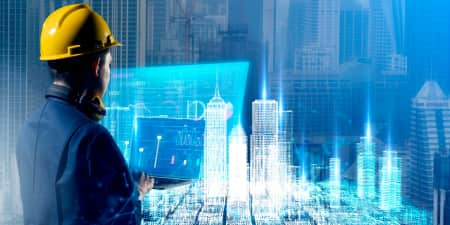The Rise of Smart Cities and the Role of Construction
Smart cities have emerged as a solution to address the many challenges of modern urban living. These smart cities leverage technology and innovation to enhance efficiency, sustainability, and the overall quality of life for their inhabitants.
Where cities begin to evolve, so does the construction industry, playing a pivotal role in bringing these futuristic urban spaces to life. In this blog, we'll cover what smart cities are and how construction plays a significant role in bringing them to life.
What Are Smart Cities? Core Features and Technologies
Smart cities are characterized by their integration of using cutting-edge technologies to optimize various aspects of urban life. These include but are not limited to the Internet of Things (IoT), artificial intelligence (AI), and sustainable practices.
The implementation of these features requires a shift in construction approaches and techniques to meet the unique demands of smart city development. As we delve into the core features and technologies, it becomes evident that the construction industry is at the forefront of this transformation.
The Construction Industry’s Role in Building Smart Cities
The traditional image of the construction industry is evolving rapidly to meet the demands of smart city projects. Embracing technology has become necessary for the sector to align with the standards set by these advanced urban spaces.
The integration of IoT in construction processes is revolutionizing the way buildings are designed and built, and the way cities are shaped. Moreover, the construction industry is learning from the data points collected by IoT, which has led to enhanced utilization of machines, improved management of parts, and more timely maintenance.
Additionally, innovative building materials and techniques are being explored to ensure structures are not only resilient but also beneficial to the smart technologies that will define the urban experience. Using IoT sensors on site allows for the data tracking of individuals and assets within an industry that has traditionally been fragmented.
Innovative Building Materials and Techniques
In the pursuit of smart city development, the construction industry is actively exploring cutting-edge materials and techniques. From self-healing concrete to 3D modeling of structures, these innovations are not only reshaping the physical landscape but also contributing to the overall sustainability and resilience of urban infrastructure.
IoT in Construction for Smart Cities
The Internet of Things has made significant inroads into the construction industry. IoT in construction is not just about connectivity; it's about creating smart construction sites.
From real-time monitoring of equipment and resources to predictive maintenance, the construction sector is harnessing the power of IoT to enhance efficiency and reduce environmental impact. Furthermore, construction times are being reduced by less unpredicted maintenance, leading to shorter construction timelines.
Challenges and Opportunities for Construction in Smart City Development
As the construction industry pivots towards smart city development, it encounters a series of challenges. Adapting to new technologies, meeting sustainability demands, and integrating complex systems will take time. Here are just a few challenges associated with this:
-
Overcoming the learning curve associated with adopting new and advanced technologies
-
Navigating the complexities of incorporating sustainable practices into traditional construction methods
-
Addressing the need for specialized skills and training in the workforce to manage complex systems effectively
However, within these challenges lie opportunities. Smart city projects present a chance for the construction sector to redefine its practices, embrace innovation, and contribute to the creation of sustainable and intelligent urban environments. These opportunities could include:
-
Pioneering innovative construction techniques and practices
-
Establishing a leadership role in developing eco-friendly construction materials
-
Seizing the chance to become industry leaders in integrating smart technologies into urban development and technology projects
Case Studies: Successful Construction Projects in Smart Cities
Examining real-world examples provides valuable insights into the tangible impact of construction in smart city development. For example, Denmark has implemented multiple smart city solutions, such as installing intelligent valves and pumps along their pipeline systems that enable active pressure management, which reduces the risk of bursts.
Another example would be the creation of paint that detects damage in concrete. Electrolytic conductive paint is applied over electrodes that are embedded in concrete around the perimeter of structures, which are used to determine and monitor potential weak points in the concrete.
These case studies illustrate how construction projects are not only shaping the efficiency of our infrastructure but also influencing the way we monitor the safety of urban environments.
The Future Outlook: Construction’s Evolving Role in Smart Urban Development
Looking ahead, future cities and the construction industry are poised for continuous adaptation and innovation. As smart city initiatives gain momentum, the role of construction will evolve further. Emerging trends such as modular construction, advanced robotics, and data-driven decision-making will shape the future of urban development. The construction sector must remain agile, embracing these changes to contribute meaningfully to creating smarter and more sustainable cities.
Conclusion
In conclusion, the construction industry stands as a key player in creating smart cities, redefining its role in the face of technological advancements and urban challenges. The journey towards smart urban development demands ongoing innovation and a commitment to sustainable practices. As we witness the evolution of cities into intelligent ecosystems, both industry professionals and the general public must stay informed about the latest developments.
To explore advanced construction solutions and remain at the forefront of this transformative wave, readers are encouraged to dive into the possibilities offered by platforms like DOZR, contributing to the construction of a smarter, more connected future.

